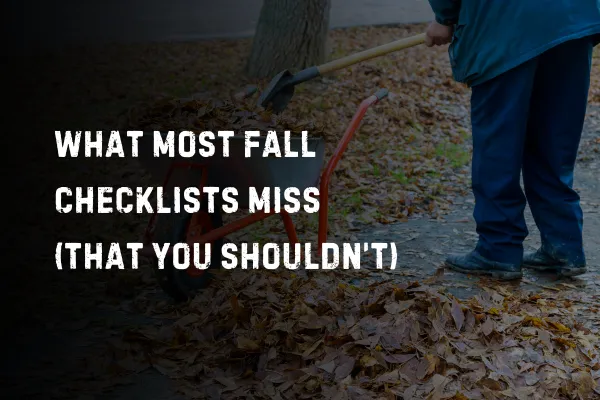
What Most Fall Checklists Miss (That You Shouldn’t)
Fall is when houses show their weaknesses. Cold nights, heavy rain, and the first windstorm are a stress test for every crack, leak, and weak branch on your property. Most homeowners tackle the obvious, but the obvious is only half the story. The checklists you find online hit the easy wins, not the things that actually keep your house out of the danger zone.
The Basics You Can’t Miss
Yes, the usual suspects still matter.
Clean the gutters
Check your roof and flashingService the furnace
Blow out sprinklers
Test smoke and carbon monoxide detectors
Skip these and you are asking for clogged drains, water damage, frozen pipes, or worse. But doing only these? That’s where most people fall short.
1. Branches That Could Take Out Your Roof
Leaves in gutters get attention, but limbs over your roof don’t. One ice storm and suddenly you are dealing with more than clogged downspouts. Walk your property. Anything hanging within 10 feet of your roof deserves an honest evaluation.
2. Exterior Paint That’s Dying a Slow Death
Paint is not about color, it is about armor. That small crack or peeling spot on your siding? It will not survive a wet PNW winter. Touch it up now or pay for water intrusion later.
3. Your Attic, the Forgotten Frontier
Everyone checks furnaces. Few check the insulation above them. Air leaks and thin insulation in your attic are like leaving a window cracked all winter. Go up there. Look for gaps, drafts, or critter signs. It is the cheapest money you will ever save on heating.
4. Driveway and Walkway Cracks
Tiny cracks in concrete seem harmless until water gets in, freezes, and suddenly you have a pothole where your kids ride bikes. Seal them before winter. Future you will thank you.
5. The Deck Nobody Touches Until May
Deck boards and railings absorb rain like a sponge. If it has been more than two years since sealing, your deck is already losing the fight. Give it a coat now and you extend its life by years.
The Bottom Line
Fall checklists are not wrong. They are just incomplete. The basics protect you from common annoyances, but it’s the overlooked items that prevent expensive disasters.
Handle both. Do the routine tasks everyone knows, then go after the hidden risks most people skip. That is how you keep your house safe, efficient, and standing strong when winter comes.